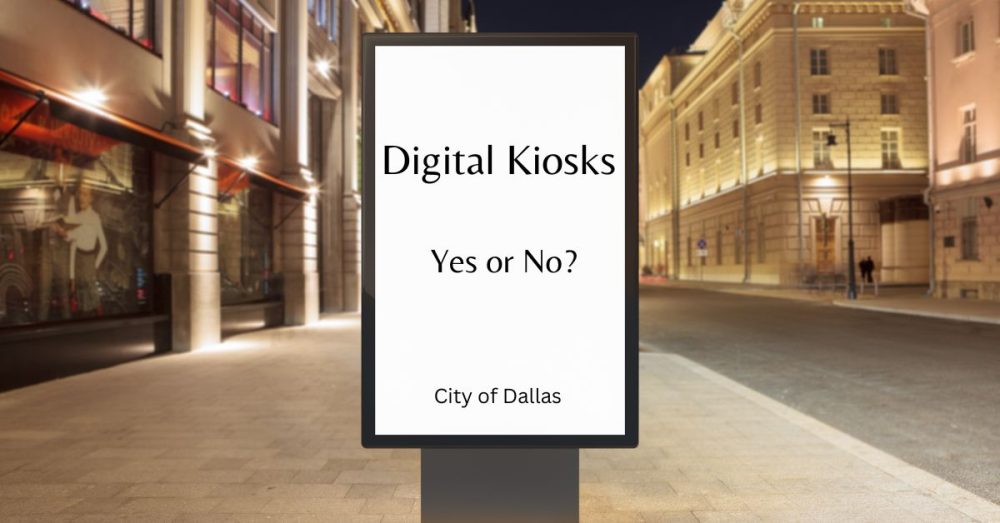Dallas officials have scheduled a public meeting for July 9 to discuss proposed ordinance changes on the use of digital kiosks.
The meeting comes a little more than two months after Ali Hatefi, the director of Public Works, briefed the Dallas City Council on the benefits of the interactive signs and the feedback the department has received from stakeholders and other cities where the units have been installed.
“Since February 28, when the [request for proposals] was canceled … several stakeholder engagement meetings were held in the city,” Hatefi said during the May 1 council meeting. “… And we had four individual and also two public hearings on April 22 and April 29 — virtual and in-person — and these are some of the concerns or ideas that we received from the stakeholders: This digital kiosk may impede walkability and therefore conflict with ADA requirements and distraction to vehicular traffic.”
Other concerns included maintenance, esthetics, revenue sharing, and the impact on property values.
Officials stopped the RFP process earlier this year to gather more community input after council members said their constituents opposed the continued operation of existing signs and the installation of other signs.
“It’s the clutter around sidewalks,” Kathy Stewart (District 10) said during the May 1 council meeting. “You guys know this. You’ve spent time, obviously, in Downtown and Uptown, and you know that you’ve got the Oncor poles. And we’re worried about moving the Oncor poles. …But before we even get them moved, we’re going to add in another item. We’re going to add something else to the clutter on sidewalks. So, I am skeptical about this.”
Kiosks began appearing throughout the city years ago after council members unanimously approved a plan to use them on sidewalks for monetization. Under the original agreement, the vendor would garner advertising revenue and share it with the city.
That contract expires on June 30, 2028, noted Hatefi.
“So, there’s the possibility that a street could have the round ones and these?” Jayne Schultz (District 11) said. “And it would cost money to cancel that contract.”
In April, then-Assistant City Manager Robert Perez said in a memo that it was preparing “an initiative to modernize the City’s communication kiosks with digital elements that provide an interactive platform to raise awareness of local businesses’ events, encourage community engagement, and enhance neighborhood safety.”
The new kiosks are somewhat different from those Dallas residents currently see on sidewalks. D Magazine called the 8-foot-tall and 3-foot-wide kiosks “sleeker” compared to the existing 6-foot-tall, 4-foot-deep “stubs.”
“At the time of the presentation, we received feedback from five municipalities … and they were all in favor of this initiative,” Hatefi explained. “However, two more cities also responded since then, and they were also in favor. And we didn’t hear anything negative from these public employees, basically.”
Those five cities are Houston, Texas; Columbus, Ohio; Detroit, Michigan; Tempe, Arizona; and Berkeley, California.
Hatefi added that stakeholders provided “positive feedback,” indicating they favored increased public safety provided by the kiosks through emergency call buttons and security cameras. Additionally, the kiosks feature local businesses that contribute “positively” to Dallas nightlife.
Among the new kiosks’ “benefits” are EV charging stations, virtual tours, Wi-Fi, a virtual concierge, a guide to trails and activity venues, and wayfinding.
“We don’t know the locations because the vendor, they have the right to select,” Hatefi said. “However, the selection of the final location has to be approved by the city. As I mentioned … we’re going to have a manual design to dictate what requirements they need to meet. For example, if there is any ordinance that they don’t allow them to install this type of digital kiosk in the area or if there are any planned developments,” as well as areas where the Americans with Disabilities Act would prohibit installation.
In the new request for proposals, installation of a minimum of 75 kiosks is required, with at least two per council district.
“We want to make sure that there is also some equity part of it that we have some kiosks in the underserved area,” Hatefi said.
Paul Ridley (District 14) seemed exasperated about how Hatefi would reconcile opposition to the kiosks’ placement.
“You have heard from numerous organizations in the community who are adamantly opposed to this,” Ridley said. “I have a list of 13, including Downtown Dallas Parks Conservancy, the Real Estate Council, Granite Properties, Uptown Dallas, Downtown Dallas, Dallas Arts District, McKinney Avenue Trolley Association, Hines, Madison Partners, Lower Greenville Neighborhood Association, the Oak Lawn Committee, and Crescent Real Estate … and they have expressed concerns about all the items that you have mentioned in your briefing, principally, additional clutter on our sidewalks.”
Interim City Manager Kimberly Tolbert said, “We will not rush into finalizing anything as it relates to another RFP without getting the task force that we’ve talked about.”
Chad West (District 1) added, “The devil’s in the details.”
Cara Mendelsohn (District 12) also opposes the installation of the kiosks. She asked Hatefi what “has to happen” if residents don’t want them in certain areas.
“I guess my take on this is that if we select a community or the selection panel for this design manual, I’m assuming that they’re going to be from each council district,” Hatefi responded. “And if that’s the case, then that council district will be represented by someone to provide input for the design manual.”
Adam Bazaldua (District 7) said the market will dictate kiosk placement.
“Some of the horror stories that we hear are just disingenuous … I hope that these kiosks are as entertaining as what this process has turned out to be because of lot of the rhetoric is very misleading.”
The City Plan Commission is expected to consider the proposed changes in September.


